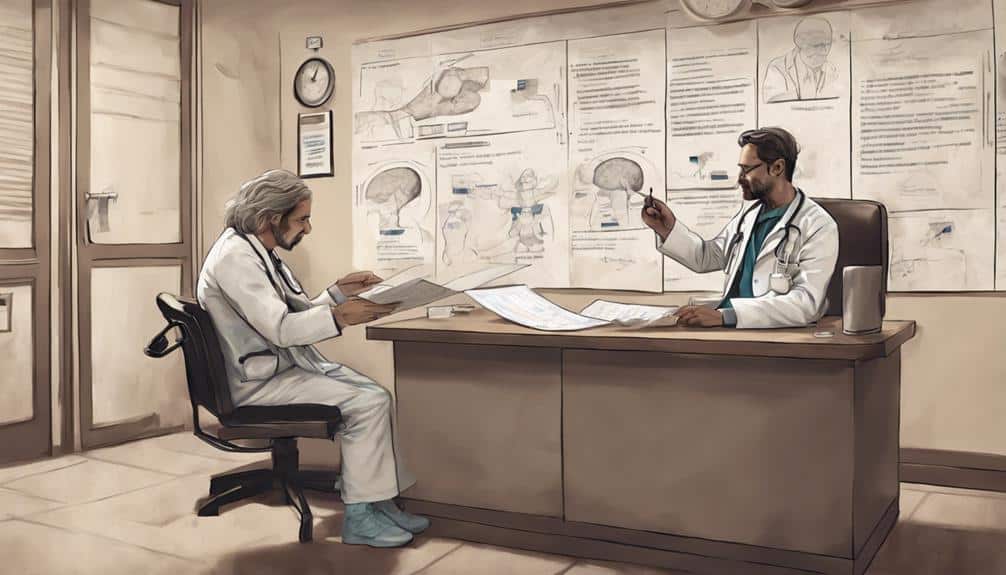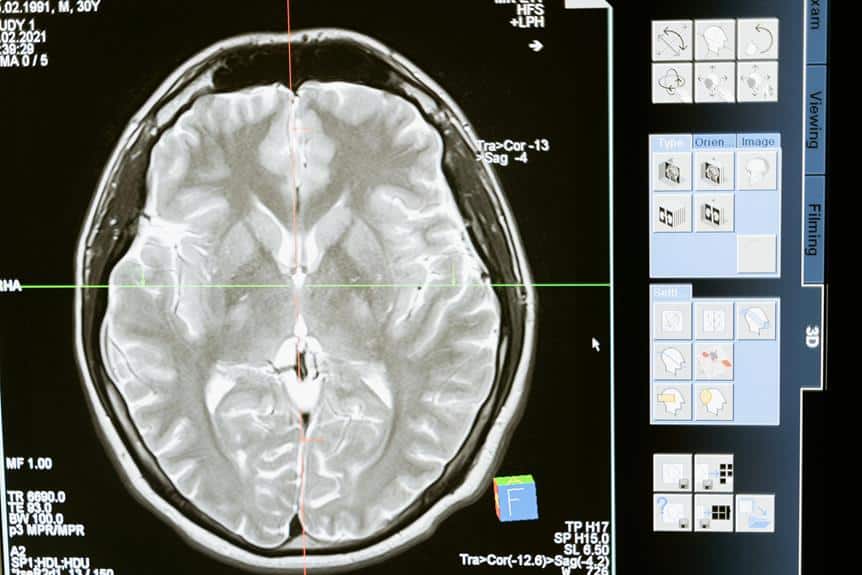How to Get Tested for Neurodivergence
I once heard someone describe getting tested for neurodivergence as akin to unlocking a hidden puzzle piece that suddenly makes the whole picture clearer. It's like piecing together a jigsaw and realizing there's a missing piece that, once found, completes the picture.
But how does one go about discovering that missing piece? Well, let me share some insights on maneuvering the path to understanding your neurodivergent profile and the steps to take in this exploration.
Key Takeaways
- Seek specialists experienced in autism and ADHD evaluations for accurate testing.
- Utilize standardized assessments like ADOS-2 or DSM-5 criteria for precise evaluations.
- Prepare with online tests as indicators, consult a GP for further evaluation.
- Collaborate with healthcare providers to develop personalized management plans and access appropriate services.
Recognizing Neurodivergent Signs

Recognizing neurodivergent signs is essential for understanding and addressing unique cognitive traits and behaviors. Signs of neurodivergence, such as delayed speech, difficulty following instructions, lack of eye contact, repetitive behaviors, and sensory sensitivities, can indicate underlying conditions that may require further evaluation. It's vital to pay attention to these signs, whether they manifest in oneself or in others, as they can offer valuable insights into individual differences in processing and responding to the world. Consulting a healthcare professional when noticing these signs is a proactive step towards gaining a deeper understanding of one's neurodivergent traits.
Keeping a record of observed behaviors and challenges is beneficial when discussing concerns during assessments. Early recognition and intervention play a significant role in improving outcomes for individuals with neurodivergent traits. Seeking a professional evaluation is important to accurately determine the presence of neurodivergence and explore appropriate strategies for support and accommodation. By acknowledging and addressing signs of neurodivergence, we can foster a more inclusive and understanding environment for individuals with unique cognitive profiles.
Choosing the Right Testing Professional

When selecting a professional for neurodivergence testing, aim for those with a strong background in evaluating conditions like autism or ADHD. It's essential to find specialists who utilize standardized tools such as the ADOS-2 or DSM-5 criteria for accurate evaluations.
Make sure to vet their qualifications and seek referrals from reliable sources to make sure you're in capable hands.
Expertise in Neurodiversity Testing
How can one identify the right testing professional with expertise in neurodiversity assessments?
When seeking a medical professional for neurodivergent tests, it's important to find specialists such as clinical psychologists, neuropsychologists, or developmental pediatricians. These professionals possess the necessary skills to assess a broad spectrum of conditions like ADHD, autism, dyslexia, and more.
Look for practitioners who utilize standardized assessments like the ADOS-2 or DSM-5 criteria for precise diagnosis and evaluation.
It's essential to choose experts who offer detailed evaluations, personalized treatment plans, and continuous support for individuals with neurodivergences. Ensuring the testing professional's credentials and experience align with neurodiversity assessments is crucial in receiving accurate and beneficial results.
Credentials and Experience
To guarantee accurate and beneficial neurodiversity testing, it's important to select professionals with relevant credentials and experience in evaluating neurodivergent traits and conditions. When seeking a testing professional, look for credentials such as psychologists, psychiatrists, or neurologists who've a background in evaluating neurodivergent conditions.
Experience in using standardized assessment tools and diagnostic criteria is essential for precise testing. Choose experts who possess a thorough understanding of neurodivergence and its nuances to make sure a thorough evaluation. It's also important that the professional follows ethical guidelines and best practices throughout the assessment process.
Understanding the Testing Process

When undergoing neurodivergent testing, it's important to understand the procedures and how results will be interpreted. This insight can provide guidance on areas for support, individual strengths, challenges, and learning preferences.
Testing Procedures Explained
Neurodivergence testing involves engaging in a series of assessments conducted by healthcare professionals to pinpoint distinctive neurological traits. These assessments are important for identifying conditions such as Autism Spectrum Disorder (ASD) and obtaining a formal diagnosis.
The evaluation process is thorough, encompassing behavioral, developmental, and cognitive aspects. Tests like the RAADS-14 Screen, Autism Quotient, and ADOS-2 are commonly used in clinical settings to guarantee accurate results.
Results Interpretation Guidance
Moving from the evaluation stage to result interpretation involves understanding how your responses align with established criteria for neurodivergence traits. Interpret your test results by comparing your scores to the thresholds for neurodivergent traits provided by the test developer.
Seek professional guidance to grasp the significance of your results, especially in relation to mental health and conditions such as autism spectrum disorder. Look for patterns in your responses that mirror common neurodivergent characteristics.
Explore resources that explain the implications of your test scores. Understanding your results is vital for gaining insight into your neurodivergent profile and can guide you towards appropriate support and interventions.
Preparing for the Neurodivergence Test

To best prepare for the neurodivergence test, it's essential to gather relevant information about the different types of tests available online. When exploring online tests for neurodivergence, consider the broad spectrum of disorders such as dyslexia, dyspraxia, and autism. While these online assessments can provide insights into potential neurodivergent traits, remember that they aren't diagnostic tools. Instead, they serve as indicators that prompt further evaluation by healthcare professionals. If your online test results suggest a high likelihood of neurodivergence, it may be beneficial to consult with a GP to discuss the next steps for assessment and support.
Delve into specific online tests tailored to conditions like ADHD, Aspergers, Autism, Developmental Language Disorder, and Disability Confident. These tests can help pinpoint particular neurodivergent traits for further consideration. Treat online neurodivergence tests as screening tools to determine if additional evaluation by a healthcare provider is warranted based on the results.
Receiving and Interpreting Test Results

Interpreting test results in collaboration with a healthcare professional is important for gaining a clear understanding of the implications for potential neurodivergent traits. It can be a complex process, so here are some key points to consider:
- Seek clarification on any terms or scores that are unclear or concerning to guarantee a thorough grasp of the results.
- Discuss the implications of the test results within the context of the neurodivergence spectrum to understand where one might fall.
- Reflect on the possibility of a neurodivergent disorder based on the test outcomes and explore appropriate next steps.
- Utilize the test results as a foundation for further evaluations or discussions with healthcare providers to address potential neurodivergent traits effectively.
Next Steps After Neurodivergence Testing

After receiving neurodivergence testing results, it's important to take proactive steps towards understanding and managing any identified traits. If the testing indicates traits related to ADHD or autism spectrum disorder, consider seeking a formal diagnosis from a healthcare professional for a more thorough evaluation. Discuss the test results with a specialist to explore potential support services and interventions tailored to your specific needs. Collaborating with healthcare providers is vital in developing a personalized plan for managing neurodivergent traits and enhancing overall well-being.
Researching local resources and support groups that cater to individuals with similar neurodivergent experiences can provide additional guidance and foster a sense of community connection. Staying informed about the latest research and developments in neurodiversity is essential for self-advocacy and accessing appropriate accommodations or services. By taking these proactive steps, you can navigate your neurodivergence journey with more clarity and empowerment.
Frequently Asked Questions
How Do I Get Tested for Neurodiversity?
To get tested for neurodiversity, I recommend seeking a referral from a healthcare provider for an assessment. Engage with specialists for thorough testing, involve in interviews and observations, and collaborate for accurate diagnosis. Early intervention and support services are essential.
How Do You Get Diagnosed With Neurodivergent?
Getting diagnosed with neurodivergence involves seeking early intervention through a professional assessment. By collaborating with specialists and sharing my experiences, I navigate the evaluation process to understand my unique traits and behaviors for tailored support.
What Are 3 Ways Someone Qualifies as Neurodivergent?
To qualify as neurodivergent, individuals often demonstrate distinct cognitive, emotional, or behavioral traits beyond the norm, leading to potential diagnosis through thorough assessments by healthcare professionals. Identification methods involve observing a range of symptoms and behaviors.
Can You Self Diagnose Neurodivergent?
Self-awareness is essential, but self-diagnosing neurodivergence can be inaccurate. Seeking support from healthcare professionals is essential for accurate evaluations and tailored treatment plans. Online tests can hint at traits, but formal diagnosis requires expert assessment.
Conclusion
Well, well, well, you've taken the plunge into the world of neurodivergence testing. Congratulations on setting off on this enlightening journey!
Remember, the results are just the beginning – seeking professional guidance is key. Stay curious, stay open-minded, and embrace your unique neurodivergent profile with confidence.
The road ahead may have twists and turns, but with the right support, you'll navigate it like a pro. Here's to revealing the mysteries of your mind!







